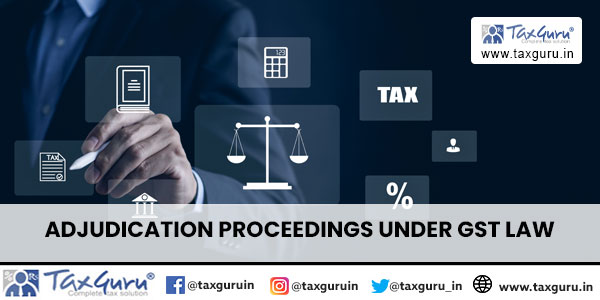Adjudication is the process of deciding an issue relating to tax matters through departmental authorities empowered to determine issues relating to classification, valuation, refund claim, tax or duty payable etc. The department raises demands by way of Show Cause Notices (SCNs) to the assessees when irregularities are observed or suspected.
Adjudication is an important function of the tax administration by the proper officers. A fair adjudication ensures that no economic loss is caused to the revenue authorities by alleged contravention by the person.
Adjudication pre-supposes issuance of a show cause notice (SCN) – an intimation to show cause, explain or defend the proposed action as mentioned in the SCN. In fact, SCN is the first limb of principle of natural justice i.e., no one should be condemned unheard. SCN should be clear, precise and unambiguous.
‘Adjudication’ has not been defined in the Act but according to www. wikipedia. org, “Adjudication is the legal process by which an arbiter or judge reviews evidence and argumentation including legal reasoning set forth by opposing parties or litigants to come to a decision which determines rights and obligation between the parties involved. The decision has to be based on settled principles of adjudication which is a quasi judicial exercise involving judicious application of mind.

Section 75 of CGST Act, 2017, provides for general provisions for determination of tax. This section provides that the period of stay, if any, would be excluded while calculating the time period for issuance of show cause notice or passing of order. The section further provides that the time period during which appeal is pending in any appellate for a would be excluded while calculating the time period for issuance of such notice or passing of order. This section also provides that no such notice needs to be issued for recovery of unpaid self-assessed tax as per return and interest thereon. This section also provides that the adjudication proceedings shall be deemed to be concluded if the order is not issued within the statutory time limit.
The authorities exercising quasi-judicial function are duty bound to justify their existence and carry credibility with the people by inspiring confidence in the adjudicatory process. The public is entitled to have assurance that process of correction is in place and working. It is the requirement of law that correction process of judgments should not only appear to be implemented but also seem to have been properly implemented. These functions, therefore, cast a heavy responsibility on the officers invested with the powers of adjudication and confiscation to use it with utmost care and caution, free from any prejudice or bias, so that the innocent does not suffer by any injustice done to him and the real offender does not escape the punishment provided by law.
Adjudication Order
- The issuance of a Show Cause Notice logically comes to an end by issuance of an order called adjudication order also called as Order-in-Original (O-I-O).
- The demand proposed in a Show Cause Notice will be dropped or confirmed by the order.
- The order is issued by the officer, called adjudicating authority who adjudicates the Show Cause Notice.
- The order generally contains the following –
1. Background and brief facts of Show Cause Notice
2. Reply to Show Cause Notice, if any (defence grounds)
3. Personal hearing (who attended, when)
4. Discussions and findings (Analysis)
5. Conclusion or order.
- An order shall follow the following principles/doctrines :
1. legislative intention
2. reasoned or speaking order
3. natural justice
4. judicial discipline
5. res judicata
6. noscitur-a-sociis
- A sustainable order is complete, legally compliant, unambiguous and properly drafted with quantified demand of tax, and penalties.
- Non-speaking and vague order ought to be avoided.
- A proper adjudication order must be a speaking or well reasoned order
- Order should be in writing, numbered, dated and signed by the adjudicating authority.
Adjudication Order – How to read and make sense therefrom
On receiving the adjudication order issued by the adjudicating authority (proper officer), the taxpayer should know/ascertain the following:
- Ascertain whether the order (Order-in-Original or O-I-O) is complete in all respects, i.e., dated, numbered, signed etc.
- Ascertain whether the order is within prescribed limitation period.
- If under CGST law, O-I-O should contain Document Identification Number (DIN) without which it will not be considered as a valid document. It may be noted that certain States have also started assigning document reference number.
- Check if OIO is complete as seen from page numbering and contains annexures/computation sheet etc. as mentioned in the O-I-O.
- Verify as to O-I-O contains correct facts of noticee as well as details of personal hearing, dates etc.
- Ascertain that O-I-O is not vague in content and contains demand of tax, interest and penalties, if any, properly quantified.
- Ascertain if the O-I-O contains any mistake or error which is apparent from record and which calls for action under Section 161 of the CGST Act, 2017 for rectification of mistake.
- Whether all the grounds/contentions of noticee have been considered and addressed.
- No demand can be confirmed on the ground other than grounds specified in the SCN.
- Whether the O-I-O has travelled beyond the scope of the SCN itself.
- Take note if the order is in violation of principle of natural justice. If so, it will have to be challenged accordingly.
- An O-I-O has to be a well reasoned/speaking order. If not so, it is a defective order which can be legally challenged.
- An O-I-O shall follow binding precedents and judicial discipline.
- An O-I-O may confirm the demand in full or allow partial or full relief. O-I-O can also order to drop the SCN proceedings.
- Further line of action by the assessee would be taken once the O-I-O is read and understood.
Principles Governing Adjudication Order
The following principles involving interpretation govern the adjudication proceedings and issuance of an adjudication order :
- An order shall follow the following principles/doctrines :
i. legislative intention
ii. reasoned or speaking order
iii. natural justice
iv. judicial discipline
v. res judicata
vi. noscitur-a-sociis
- Non-speaking and vague order ought to be avoided.
- A proper adjudication order must be a speaking or well reasoned order
- Ascertain whether the order is within prescribed limitation period.
- An O-I-O shall follow binding precedents and judicial discipline.
- No demand can be confirmed on any ground other than grounds specified in the SCN itself.
Adjudication order: Actions to follow
Once an assessee receives the adjudication order (order-in-original), following actions should follow :
- Read the O-I-O carefully line-by-line, particularly paras on discussions, findings and conclusion.
- Make notes/summary for internal discussion and deciding further course of action.
- See that the O-I-O is proper and captures all details correctly and completely, at least on factual matrix.
- Based on the order, decide whether to :
i. Accept the order and deposit the demand in full, if any.
ii. Accept the order partially and deposit the admitted amount and prepare for filing the appeal, i.e., contesting the order.
iii. Don’t accept the order and decide to file an appeal before appropriate appellate authority.
- If there are mistakes/errors apparent on the face of record, assessee may seek remedy of rectification of errors provided under Section 161 of the CGST Act, 2017.
- Subject to Section 161, an adjudication order shall be considered as a valid order in terms of Section 160 of CGST Act, 2017.





